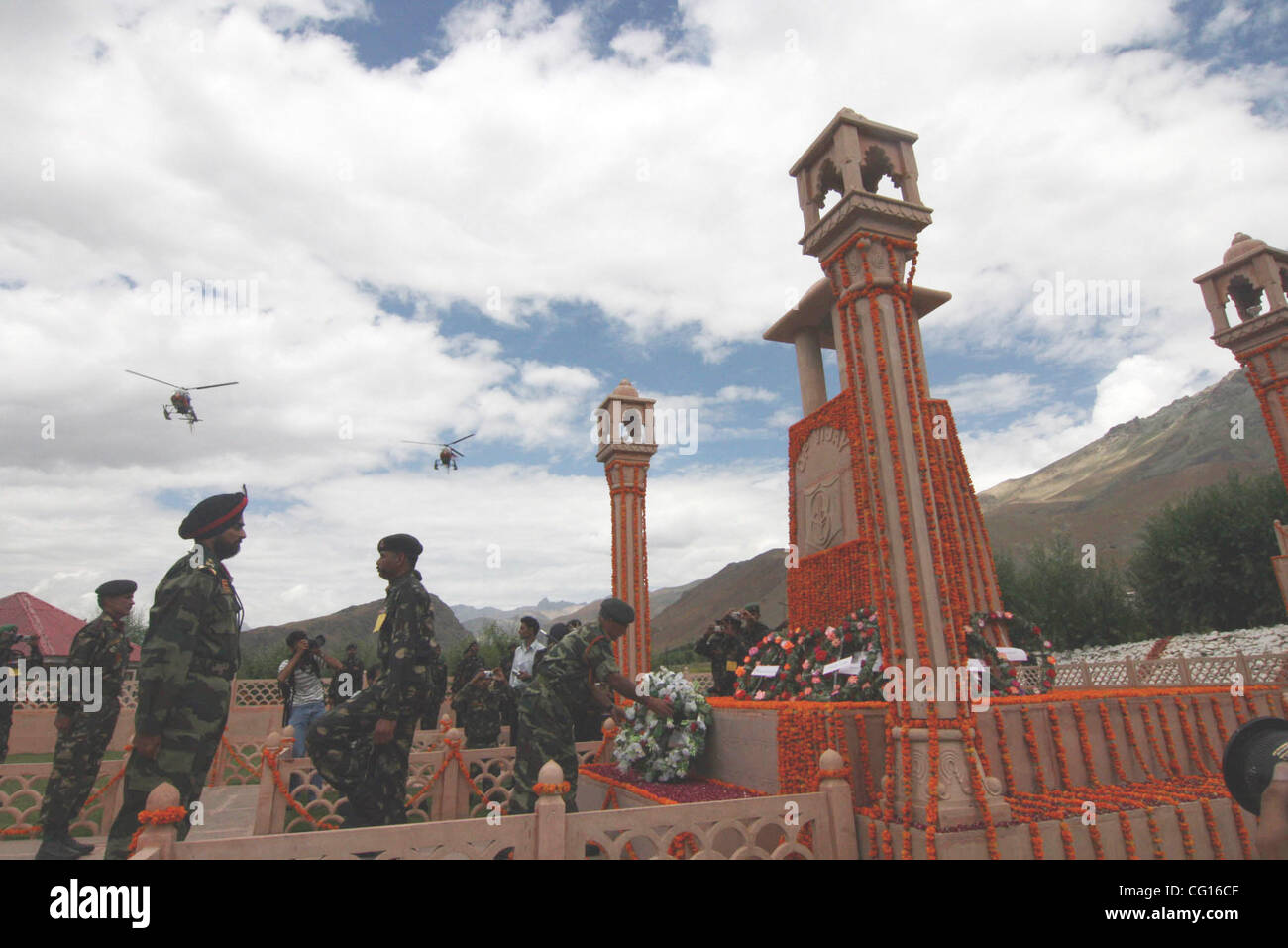


The Indian Army's Northern Command commemorated Vijay Diwas, which marks India's victory over Pakistan in the 1971 war, with wreath-laying ceremonies led by General Officer Commanding-in-Chief Lt Gen M V Suchindra Kumar. The Tiger Division also held a ceremony at a war memorial in Jammu, while in Ladakh, the Army paid tribute to fallen soldiers at the 'Hall of Fame' with a solemn ceremony. The event served as a reminder of the sacrifices made by the Indian armed forces during the war, and a commitment to protect the sovereignty of the nation.
Vijay Diwas: Commemorating India's Victory in the 1971 War
Background
Vijay Diwas (Victory Day) is celebrated annually on December 16 in India to commemorate the country's decisive victory over Pakistan in the 1971 war. The war, which lasted just 13 days, resulted in the creation of Bangladesh as an independent nation.
The conflict began when Pakistan launched an offensive against India on December 3, 1971. Pakistan's intention was to quell a growing independence movement in its eastern wing, which later became Bangladesh. India, in support of the Bengali nationalists, responded with a full-scale military intervention against Pakistan.
The Indian Army, led by Chief of Army Staff General Sam Manekshaw, launched a swift and decisive campaign into East Pakistan. Within two weeks, Indian forces had liberated the region and captured over 93,000 Pakistani soldiers. On December 16, 1971, the Pakistani commander in East Pakistan, Lieutenant General A.A.K. Niazi, signed an instrument of surrender at the Ramna Race Course in Dhaka, marking India's victory in the war.
Commemoration
Every year, Vijay Diwas is celebrated across India with various events and ceremonies. Wreaths are laid at war memorials to pay tribute to the fallen soldiers. Gallantry awards are presented to soldiers who distinguished themselves during the war. Prime Minister and other dignitaries pay homage to the martyrs and address the nation on this occasion.
In 2022, the Northern Command of the Indian Army commemorated Vijay Diwas with wreath-laying ceremonies in Jammu and Kashmir and Ladakh. The Tiger Division held a ceremony at a war memorial in Jammu, while in Ladakh, the Army paid tribute to fallen soldiers at the 'Hall of Fame' with a solemn ceremony.
Top 5 FAQs
1. What is the significance of Vijay Diwas? Vijay Diwas commemorates India's victory over Pakistan in the 1971 war and the creation of Bangladesh. It is a day to honor the sacrifices made by Indian soldiers and to reaffirm the country's commitment to protecting its sovereignty.
2. When and how did the 1971 war start? The war began on December 3, 1971, when Pakistan launched an offensive against India to suppress the independence movement in East Pakistan. India responded with a full-scale military intervention to support the Bengali nationalists.
3. How long did the 1971 war last? The war lasted only 13 days, ending with Pakistan's surrender on December 16, 1971.
4. What was the outcome of the 1971 war? India's victory in the war resulted in the creation of Bangladesh as an independent nation. India also gained control of over 93,000 Pakistani soldiers who were captured in East Pakistan.
5. How is Vijay Diwas celebrated today? Vijay Diwas is celebrated across India with various events and ceremonies, including wreath-laying ceremonies at war memorials, gallantry awards presentations, and speeches by dignitaries.

On day 1,312 of Russia's war on Ukraine, tensions continue to escalate as Ukrainian drones target a Russian oil pumping station, Russian forces seize three more villages in eastern Ukraine, and NATO increases its presence in the Baltic Sea region. In response to the ongoing conflict, the Ukrainian security service reports that the SBU caused a fire and halted operations in the Chuvashia region, while Russia's military announced its continued advance in Donetsk and Dnipro. Meanwhile, NATO's decision to deploy additional military assets comes after several days of unidentified drone sightings in Denmark and at military bases.

The upcoming India-Australia ODI series has drawn attention for multiple reasons, including the successful return of Rohit Sharma and Virat Kohli as white-ball players. Despite being relieved of captaincy, the duo is expected to continue playing in the format until the 2027 World Cup, according to Australia's Travis Head and India's Axar Patel. As both teams gear up for a high-stakes clash, the focus remains on the future of these two icons and their potential to lead India to another ODI World Cup victory.

Pakistani security forces have thwarted a suicide attack targeting their camp in Mir Ali, North Waziristan, after a vehicle loaded with explosives was driven into the perimeter wall. In a separate operation, 34 militants described as "India-backed terrorists" were killed in multiple engagements across Khyber Pakhtunkhwa. These operations form part of Pakistan's continued efforts to eliminate foreign-sponsored terrorism from the country under the vision "Azm-e-Istehkam."

Amid an intensified wave of militant activity in Pakistan's northwestern tribal belt bordering Afghanistan, security forces successfully foiled a major suicide attack on a military camp in North Waziristan's Mir Ali area. Four terrorists, including a suicide bomber, were killed in the exchange, with no casualties among security personnel. The incident highlights the ongoing threat of militant activity in the region, with recent counterterrorism operations resulting in the death of 88 militants, including several from the Tehreek-e-Taliban Pakistan (TTP).

Former US President Donald Trump shared news on his social media platform about a “very productive” phone conversation with Russian President Vladimir Putin, where they discussed progress towards ending the Russia-Ukraine war. Trump mentioned the possibility of a summit in Budapest involving top advisors from both countries, while also revealing that he will be meeting with Ukrainian President Volodymyr Zelenskyy to discuss the call and other matters. As India’s economy continues to grow, its luxury market is also thriving with high-end brands investing in the country to meet the increased demand.

Ukrainian President Zelensky is currently in Washington to meet with US President Trump. This meeting comes after Trump had a productive phone call with Russian President Putin, where they agreed to face-to-face talks in Hungary. Trump is considering arming Ukraine with advanced Tomahawk missiles, but stated that the US stockpile must also be preserved. Meanwhile, Trump has promised to update Zelensky on his discussions with Putin and believes that progress has been made.

The Ministry of External Affairs has denied that a phone conversation took place between Indian Prime Minister Narendra Modi and US President Donald Trump on Wednesday, contradicting Trump's claim that Modi personally assured him that India would stop purchasing Russian crude oil. Trump had announced this move as a big step, describing that the process had already begun. However, MEA spokesperson Randhir Jaiswal clarified that there was no discussion between the two leaders during a weekly briefing. This contradiction comes after the last confirmed phone call between the two on 9 October, when they discussed trade negotiations.

President Donald Trump announces plans to meet with Russian President Vladimir Putin in Hungary, following a productive phone call between the two leaders. The talks will include high-level advisers from both sides, led by US Secretary of State Marco Rubio. However, there is little indication of progress in ending the war in Ukraine, and Trump is likely to face pressure from Ukrainian President Volodymyr Zelensky during his visit to Washington, D.C. for the US to provide military support to Ukraine.

US and Russian Presidents Donald Trump and Vladimir Putin have had their first conversation since August, with plans to meet in person in Hungary. They discussed trade and teams from both countries will meet next week. This came a day before Ukraine's President Zelensky's visit to the White House and amid discussions about arming Ukraine with deep-striking Tomahawk missiles. Despite the talks, Ukraine's ambassador to the US says Moscow's recent actions show their real attitude towards peace and call for tougher responses such as sanctions and military reinforcement.

EU foreign policy chief Kaja Kallas has announced plans for a new anti-drone system in response to ongoing fears of Russian aggression. The proposed "defence roadmap" includes measures such as improving Eastern borders and creating air and space shields. With several European countries facing airspace incursions, the EU is taking steps to be fully prepared for possible conflict by 2030. The announcement comes ahead of talks between US President Donald Trump and Russian President Vladimir Putin, with Trump indicating that the US could provide Ukraine with long-range missiles if the war in Ukraine continues.